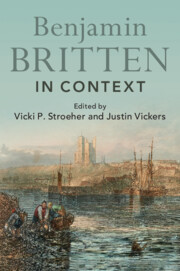Book contents
- Benjamin Britten in Context
- Composers in Context
- Benjamin Britten in Context
- Copyright page
- Dedication
- Contents
- Figures
- Tables
- Notes on Contributors
- Acknowledgements
- Bibliographic and In-Text Abbreviations
- Prologue
- Part I The Britten Circle(s)
- Part II British Musical Life
- Part III Britten and Other Composers
- Chapter 17 The Compositional Context
- Chapter 18 Responding to a British Musical Past
- Chapter 19 Britten and the English Musical Renaissance
- Chapter 20 Responding to the Continent
- Chapter 21 An English Tradition?
- Chapter 22 ‘An Exciting Time with All the Russians’
- Chapter 23 The Avant-Garde
- Part IV Wordsmiths, Designers, and Performers
- Part V British Sociocultural, Religious, and Political Life
- Further Reading
- Index
Chapter 21 - An English Tradition?
from Part III - Britten and Other Composers
Published online by Cambridge University Press: 31 March 2022
- Benjamin Britten in Context
- Composers in Context
- Benjamin Britten in Context
- Copyright page
- Dedication
- Contents
- Figures
- Tables
- Notes on Contributors
- Acknowledgements
- Bibliographic and In-Text Abbreviations
- Prologue
- Part I The Britten Circle(s)
- Part II British Musical Life
- Part III Britten and Other Composers
- Chapter 17 The Compositional Context
- Chapter 18 Responding to a British Musical Past
- Chapter 19 Britten and the English Musical Renaissance
- Chapter 20 Responding to the Continent
- Chapter 21 An English Tradition?
- Chapter 22 ‘An Exciting Time with All the Russians’
- Chapter 23 The Avant-Garde
- Part IV Wordsmiths, Designers, and Performers
- Part V British Sociocultural, Religious, and Political Life
- Further Reading
- Index
Summary
Is there such a thing as an English compositional tradition in the twentieth century? And if so, what is Britten’s place in it? Harrison Birtwistle thought not, and one can understand why. There is no obvious point of continuity from one generation to another: Parry and Elgar’s reference points are Austro-German, while Holst’s and Vaughan Williams’s music is modally based and considerably affected by English folk music. Delius spent most of his life outside England, and his aesthetic and compositional predilections are the most difficult to relate to a tradition. Britten and Tippett both abjured what they saw as the stultifying nationalism of Holst and Vaughan Williams and embraced aspects of international modernism. Despite the fractures, however, there are aspects in common: it is through themes from English landscape and literature that connections between generations are most clearly seen: in pastoralism, for instance, whether ‘soft’ or ‘hard’; in the role of melancholy; in the preference for particular genres; and in the reworking of aspects of the English musical past.
Keywords
- Type
- Chapter
- Information
- Benjamin Britten in Context , pp. 180 - 187Publisher: Cambridge University PressPrint publication year: 2022

